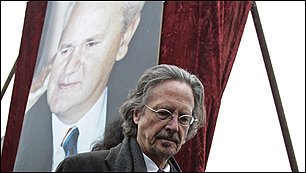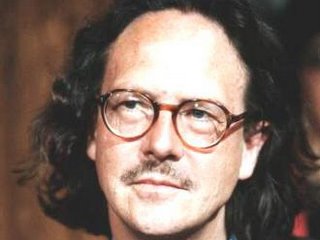PETER HANDKE - SREBRENICA GENOCIDE DENIER
Srebrenica Genocide Denier and Milosevic's Darling Kicked from French Theatre
 ... and then Awarded $50,000 EURO Literary Price - guess where? - in Germany (country with rich Nazi past, never-ending Holocaust denial, incurable Anti Semitism & Islamophobism). To award Srebrenica Genocide denier with $50,000 is same as awarding Adolph Hitler with Nobel Prize for Peace.
... and then Awarded $50,000 EURO Literary Price - guess where? - in Germany (country with rich Nazi past, never-ending Holocaust denial, incurable Anti Semitism & Islamophobism). To award Srebrenica Genocide denier with $50,000 is same as awarding Adolph Hitler with Nobel Prize for Peace.Handke, who lives in France, said in an essay in the French newspaper Libération: "Let's stop laying the massacre … on the backs of the Serbian military and paramilitary. And listen -- at last -- to the survivors of the Muslim massacres in numerous Serbian villages around Srebrenica."
One of Handke's greatest plays, The Art of Asking was scheduled by the French public theatre company, the Comédie Française.
 On April 29, 2006, the daily Libération reported that Marcel Bozonnet had decided to scrap the play after having read a snippet published on April 6, 2006 in the Nouvel Observateur, a weekly magazine published every Thursday. The snippet called a sifflet (a "whistle") -- by the journalist Ruth Valentini read:
On April 29, 2006, the daily Libération reported that Marcel Bozonnet had decided to scrap the play after having read a snippet published on April 6, 2006 in the Nouvel Observateur, a weekly magazine published every Thursday. The snippet called a sifflet (a "whistle") -- by the journalist Ruth Valentini read: Peter Handke in Pozarevac
"I am happy to be close to Slobodan Milosevic, who has defended his people," said -- in Serb -- Peter Handke on March 18 on Liberation Square, in Pozarevac. The guest flaunted his grief along with 20,000 fanatics. Loyal to the "Butcher of the Balkans" and to his own revisionist position, the Austrian writer, author of Justice for Serbia, had come as a "truth seeker." Thus Handke, for whom "to be pro-Serb is a honorific title," persists in his defense of "Slobo," considers that the Serbs are "the real victims of the war," approves the Srebrenica massacre and other crimes done in the name of ethnic cleansing. Waving the Serbian flag, squeezing forward to touch the hearse and lay his red rose, Handke looks a sorry sight. With his tribute to the despot, the poet has definitively dug the grave of his lost honor.
"For three weeks . . . I have been plunged back into the horror of ethnic cleansing," Bozonnet said as he confirmed that Handke's Voyage to the Sonorous Land or the Art of Asking would not be staged in January.
Those who, unlike Handke, were eyewitnesses to the horrors of Serbian concentration camps in Bosnia, like an American journalist and Pulitzer Prize winner, Roy Gutman, called these camps concentration camps and death camps.
Following his warped logic, Handke appealed to the wider public to stop making connection between Serbian military and paramilitary forces and slaughters of innocent civilians in Bosnia, including the most notorious one in Srebrenica, where at least 8000 Bosniak civilians, were killed by regular Serb forces under the command of Ratko Mladic.
Bozonnet gave a press conference on May 4, 2006 to expand on his decision:
For three weeks, I reviewed European history, from 1990 to date. I reviewed this terrible film! I reviewed it in my mind, ladies and gentlemen! I plunged back in this horror that ethnic cleansing was, the planning of these facts, of these crimes. I learned about all that Peter Handke had said, which I did not know . . . . I was scandalized by what Peter Handke said. In part I knew it but I did not know the extent: the work of historians systematically questioned, of war correspondents, of your papers, ladies and gentlemen, that have admirably informed us for years, that thanks to their work, their courage, pierced the wall of indifference. This is I found out what Peter Handke ridiculed....These are no longer suppositions, one cannot doubt Milosevic's actions....it's unbelievable, he does not know where is the world, he does not know where is the truth, he does not know where is history, he does not believe in the accounts from witnesses: that's what he said on Milosevic's grave!


<< Home